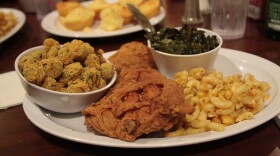When was researching his book on the , he kept coming across references to African-American cooks who had served in the White House. While digging into historical newspaper clips, he discovered anecdotes and names that eventually allowed him to identify 150 cooks of African descent who have worked in the presidential kitchens since the 1700s.
His research convinced him of the role food plays in creating a lens through which we view presidents and perceive their characters. And their stories showed that their influence often extends well beyond the kitchen.
In his , Miller brings these stories to life. ŌĆ£The PresidentŌĆÖs Kitchen Cabinet: The Stories of African-Americans Who Fed Our First Families, From the Washingtons to the ObamasŌĆØ provides plenty of anecdotes that reveal our presidentsŌĆÖ tastes in food and policy.
Food choices played into image creation for every president since George Washington, Miller says. Thomas Jefferson tried to indulge his love of French cuisine by training his enslaved cooks on favorites like macaroni and cheese. At that time, ŌĆ£There was an ongoing rivalry between French cooking and American cooking,ŌĆØ says Miller. ŌĆ£And the face of American cooking was black women.ŌĆØ
Other presidents went well out of their way to prove their affinity for down-home favorites. When Lyndon B. JohnsonŌĆÖs administration released recipe cards for the presidentŌĆÖs Texas-style all-meat chili, ŌĆ£Americans freaked out and wanted to know if their president loved beans,ŌĆØ Miller reports. A conversation between the presidentŌĆÖs private secretary Juanita Roberts and longtime family cook Zephyr Wright was the subsequent effort at spin control.
ŌĆ£I call it the ŌĆśpresidential pickle,ŌĆÖŌĆØ Miller says. ŌĆ£We want our presidents to be extraordinary people, but we also want them to be a lot like us.ŌĆØ
African-American cooks in the White House were sometimes able to achieve acclaim and notoriety at a time when blacks were almost never highlighted in the press for positive reasons. But in his book, Miller argues that this acclaim was for their success in a role whites were comfortable with. In that way, they remained mostly constrained by racial stereotypes that were both negative and simplistic.
ŌĆ£Well into the 20th century, cooking was one of the few professions African-Americans could pursue and excel in,ŌĆØ says Miller. ŌĆ£ItŌĆÖs part and parcel of the whole idea that African-Americans were born servants and natural cooks.ŌĆØ
But several of the White House cooks Miller profiles wielded influence that was not confined to the kitchen. In his book, Miller reveals how some of them became family confidantes and even civil rights advocates.
Lizzie McDuffie, a maid who helped cook for Franklin Delano Roosevelt, went on the stump for him in 1936. She spoke publicly in eight cities with large black populations. Lyndon B. JohnsonŌĆÖs cook Zephyr Wright also had a strong influence on his political transition. Johnson would sometimes check in with her about how he was doing with black voters, and her experiences in the segregated South swayed Johnson to lobby Congress to pass the Civil Rights Act.
ŌĆ£She suffered so many indignities,ŌĆØ Miller says. ŌĆ£She couldnŌĆÖt go to the bathroom. She couldnŌĆÖt eat with the family.ŌĆØ Finally Wright refused to make the trip at all. Miller says that when the Civil Rights Act passed, Johnson handed her one of the pens he used to sign it saying, ŌĆ£You deserve this as much as anyone.ŌĆØ
ŌĆ£Primarily these cooks gave these presidents a window on black life that they otherwise wouldnŌĆÖt have had,ŌĆØ says Miller. ŌĆ£Many didnŌĆÖt open it. But those who did made our nation better.ŌĆØ
Host Frank Stasio talks with Miller about the people behind the presidentŌĆÖs food and their role in history








